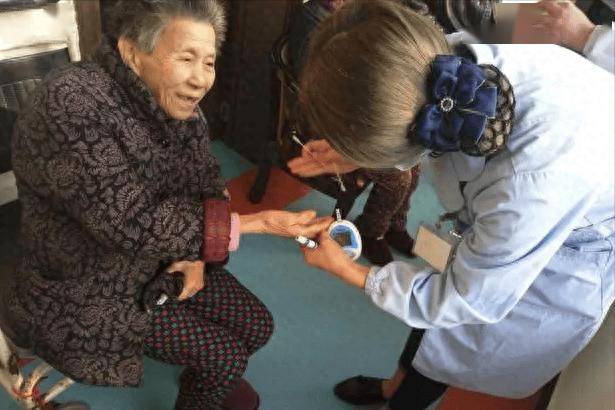Before reading this article, we sincerely invite you to click “Follow”, which will not only facilitate your discussion and sharing but also provide you with more professional health knowledge to help safeguard your health. Thank you for your support.
What exactly is diabetes?
This question troubles many patients who have just been diagnosed with diabetes. They are often surprised that this disease is not simply about “eating too much sugar.”
In order to make it easier for everyone to understand and to increase the interest in medical popularization, I will combine some clinical cases to explain to everyone using examples.
Gao Dama was a normal high school teacher, busy with teaching and housework on a daily basis, rarely having time to delve into health knowledge.
However, this time, she was particularly concerned about the issue of diabetes because not long ago, one of her old friends was diagnosed with diabetes.
At a gathering with friends, whenever the topic of diabetes was mentioned, it was always simplistically attributed to eating too much sugar. However, this check-up gave her the chance to directly ask the doctor for the truth.
In a corner of the hospital, Gao Dama finally met Dr. Li who was in charge of her health examination.
Without hesitation, Gao Dama directly raised her question, “Dr. Li, I have always been curious, is diabetes really just because of sugar consumption?”
Dr. Li picked up a data chart on the table and explained, “Gao Dama, diabetes is actually a complex metabolic disease with many reasons. It’s not just about sugar consumption; dietary habits are only a part of it.”
Pointing to the data on the chart, Dr. Li continued, “First, genetic factors.”
Furthermore, Dr. Li mentioned the second factor – weight.
He explained, “Being overweight, especially having excess abdominal fat, can lead to reduced sensitivity to insulin in the body, known as insulin resistance.”
Third, lack of exercise. Dr. Li said that he encourages Gao Dama and her family to increase physical activity to help improve the body’s efficiency in utilizing sugar.
Fourth, age factor. He explained that although this is an inevitable natural process, it can be greatly delayed through proper diet and regular exercise.
After explaining these factors, Dr. Li also reminded Gao Dama to pay attention. Even if genetic factors and age cannot be changed, controlling the risk of diabetes can still be effectively achieved by adjusting lifestyle and dietary habits.
After explaining the common causes of diabetes in depth, Dr. Li looked at Gao Dama’s family and felt that they seemed to want to know more.
He decided to share a diabetes risk factor that is often overlooked but extremely important – dysbiosis of the microbiota.
This topic may be somewhat novel to most patients, but it is gradually becoming a hot topic in medical research.
“You may not often hear about it, but there are billions of bacteria in our intestines, and the balance of these bacteria in terms of types and quantities, or our intestinal microbiota, has a profound impact on our health.”
As Dr. Li spoke, he observed the reactions of Gao Dama and her family to ensure they could keep up with this slightly complex topic.
“Did you know? By adjusting your diet, such as increasing foods rich in fiber, you can promote the growth of these beneficial bacteria, which in turn may help improve insulin sensitivity.”
Showing a chart, Dr. Li continued, detailing the potential effects of different types of food on the gut microbiota.
“For example, whole grains, legumes, and fruits and vegetables, which are rich in complex carbohydrates and fiber, can provide food for the good bacteria in our intestines, helping them multiply. This, in turn, can help us better control blood sugar.”
He then added a point that might be very new to Gao Dama and her family, “Not only that, our sleep habits, stress levels, and even our social activities can affect blood sugar.”
“For instance, chronic sleep deprivation may lead to an imbalance in intestinal microbiota, closely related to poor blood sugar control. Therefore, ensuring an adequate amount of sleep is not just to avoid fatigue for the next day but also a way to protect your pancreatic function.”
As he finished explaining, Dr. Li noticed that Gao Dama seemed a bit puzzled and asked, “Gao Dama, do you have any questions?”
Gao Dama hesitated for a moment and then asked, “Dr. Li, if there are children in the family, how should we cultivate good dietary and lifestyle habits from a young age to prevent diabetes?”
Dr. Li nodded and replied, “Children should be encouraged to eat more vegetables and whole grains from an early age. These foods can not only help them establish a healthy gut environment but also provide rich nutrients.”
“Ensure that children get enough exercise, which will not only help them maintain a suitable weight but also enhance their overall physical health.”
What are your thoughts on diabetes? Feel free to discuss in the comments section!
Reference:
[1] Hu Ruiping. Discussing the Mechanism of Rosiglitazone on the Pancreatic Cancer Model of Diabetic Mice Based on Its Impact on Sugar Transport and Metabolism through PPARγ, Chinese Pharmacological Bulletin, June 21, 2024


